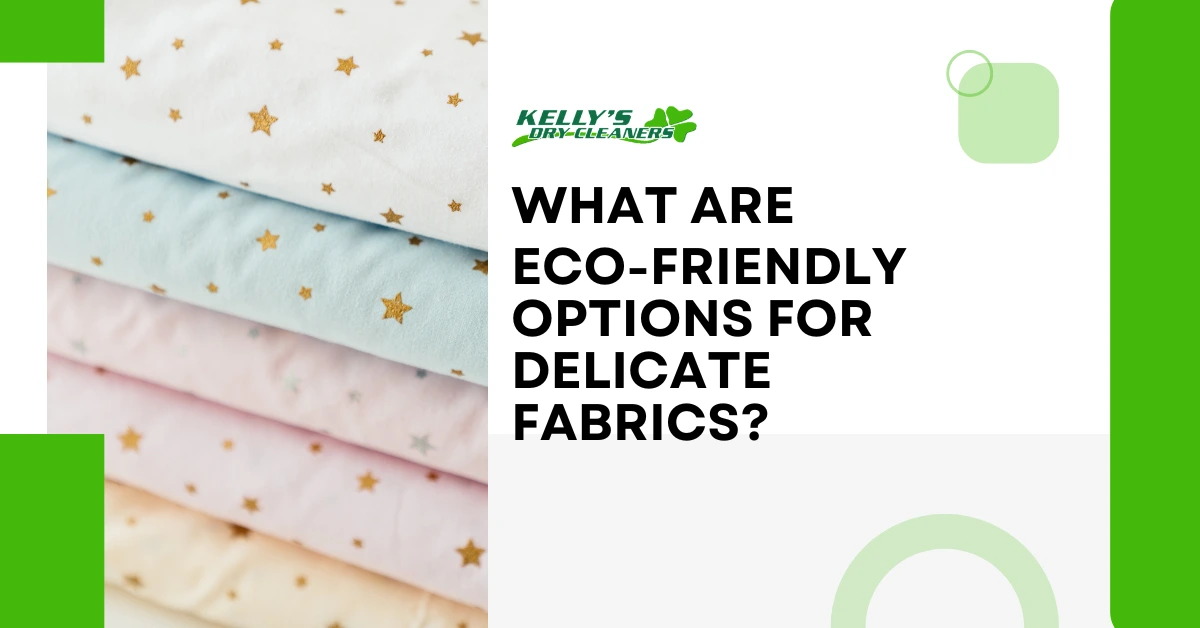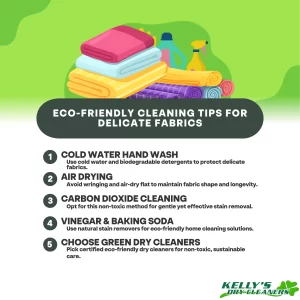You can care for delicate fabrics like silk and lace with eco-friendly options that keep them looking great while being kind to the planet. Start by hand washing in cold water using biodegradable or plant-based detergents to avoid harsh chemicals. Avoid wringing your fabrics; instead, air dry or lay them flat to prevent stretching. Consider trying innovative methods like carbon dioxide cleaning, which lifts dirt without damage. For a professional touch, choose green dry cleaners that use non-toxic solvents. There are plenty of sustainable practices to explore, ensuring your wardrobe stays beautiful and eco-conscious.
Key Takeaways
-
Hand wash delicate fabrics in cold water using plant-based detergents to protect their integrity and extend their lifespan.
-
Utilize water-based cleaning solutions that are biodegradable and gentle on fabrics like silk and lace.
-
Explore innovative methods like carbon dioxide cleaning for non-toxic, effective stain removal without damaging delicate materials.
-
Choose eco-friendly brands with positive reputations, focusing on certifications like cruelty-free and organic labels for added assurance.
-
Implement home techniques like vinegar solutions and baking soda pastes for natural stain removal while maintaining fabric care sustainability.
Understanding Delicate Fabrics
Understanding delicate fabrics begins with recognizing their unique characteristics. You’ll encounter various fabric types like silk, lace, and chiffon, each requiring special attention. These materials are often lightweight and can easily lose their shape or develop snags if mishandled.
Opting for eco-friendly cleaning methods can also increase the longevity of these fabrics while minimizing exposure to harmful chemicals commonly found in traditional dry cleaning.
When caring for delicate fabrics, it’s essential to follow some key care tips. Always check the label for specific instructions before washing. Hand washing in cold water is typically gentler than machine washing, so consider this method for your silk blouses or lace garments.
If you must use a machine, opt for a delicate cycle with a mesh laundry bag to protect the fabric.
Drying is equally important. Avoid wringing out these fabrics, as it can cause stretching. Instead, lay them flat on a clean towel or hang them to air dry.
Ironing delicate fabrics can be tricky too; use a low heat setting and place a cloth between the iron and the fabric to prevent scorching.
Importance of Eco-Friendly Cleaning
When you choose eco-friendly cleaning methods for your delicate fabrics, you’re making a positive impact on the environment. Not only does this approach promote a healthier home, but it also helps preserve the longevity of your favorite garments.
By opting for sustainable fabric care, you contribute to a greener planet while keeping your clothes in top shape.
Eco-friendly methods, like non-toxic, silicone-based liquids that are safe for both humans and the environment, also ensure that your cleaning practices don’t pose health risks or contribute to pollution.
Environmental Impact Awareness
The growing awareness of environmental impact has made eco-friendly cleaning essential for preserving delicate fabrics and the planet. When you choose sustainable choices for cleaning your items, you’re not just protecting your cherished fabrics; you’re also contributing to a healthier environment.
You might wonder how your choices affect the larger picture. Each time you select biodegradable detergents or natural stain removers, you’re supporting industries that prioritize sustainability. This collective shift towards eco-friendly practices can lead to substantial changes in manufacturing and waste management.
Plus, it sets an example for others, encouraging friends and family to reflect on their own cleaning habits.
Incorporating eco-friendly cleaning methods into your routine not only helps maintain the integrity of your delicate fabrics but also aligns your lifestyle with a commitment to the planet.
You can feel good knowing that your sustainable choices contribute to a cleaner, greener world for future generations.
Healthier Home Benefits
Eco-friendly cleaning options can provide significant health benefits for your home. By choosing natural products, you’re not just protecting delicate fabrics, but also promoting a healthier living environment for you and your family.
Here are three key benefits:
-
Natural Air Purification: Eco-friendly cleaners often contain plant-based ingredients that help purify the air without releasing harmful chemicals. This means fresher air and a reduction in indoor pollutants.
-
Toxin Reduction: Many conventional cleaners are loaded with toxic substances that can lead to respiratory issues and skin irritations. By utilizing eco-friendly alternatives, you minimize these risks, creating a safer space for your loved ones.
-
Allergy Relief: Natural cleaning products are less likely to trigger allergies or sensitivities. By opting for these options, you support a more comfortable home, especially for those prone to allergic reactions.
Water-Based Cleaning Solutions
Using water-based cleaning solutions can be a game changer for maintaining delicate fabrics. These eco-friendly options not only help protect your cherished garments but also contribute to a healthier environment.
Water-based cleaners often feature biodegradable solutions and gentle formulas, making them ideal for sensitive materials.
They also align with sustainable practices by reducing chemical pollution and preserving garment quality over time, which is vital for eco-conscious consumers .
Here are three benefits of using water-based cleaning solutions:
-
Gentle on Fabrics: Their mild nature guarantees that even the most fragile fabrics, like silk or lace, won’t suffer damage during cleaning.
-
Eco-Friendly: Since they’re often made from biodegradable ingredients, you can feel good knowing you’re reducing your environmental footprint.
-
Effective Cleaning: These solutions tackle stains and odors without harsh chemicals, leaving your clothes fresh and clean.
When choosing a water-based cleaner, look for products specifically designed for delicate fabrics to guarantee maximum care.
With these gentle yet effective options, you’ll maintain the beauty and integrity of your favorite garments while being kind to the planet.
Plant-Based Detergents
When you choose plant-based detergents for your delicate fabrics, you’re opting for a gentler, eco-friendly cleaning solution. These detergents not only benefit the environment but also protect the integrity of your garments.
It’s important to select the right brand to guarantee you’re getting the best performance without harmful chemicals.
Benefits of Plant-Based Detergents
Plant-based detergents offer a gentle yet effective solution for washing delicate fabrics. By using plant-based ingredients, these detergents clean without the harsh chemicals found in traditional options, making them safer for both your clothes and the environment.
Here are three key benefits of using plant-based detergents:
-
Gentleness on Fabrics: They’re designed to be soft on delicate materials, reducing the risk of wear and tear.
-
Eco-Friendly Packaging: Many brands focus on sustainable packaging, minimizing plastic waste and promoting a greener lifestyle.
-
Biodegradable Formulas: The ingredients break down naturally, ensuring that your laundry routine doesn’t harm aquatic ecosystems.
Choosing the Right Brand
With a wide array of brands available, selecting the right plant-based detergent can feel overwhelming. To simplify your choice, start by researching each brand’s reputation.
Look for companies that prioritize eco-friendliness and have positive customer feedback. A solid reputation often indicates a commitment to quality and sustainability, which is vital when caring for delicate fabrics.
Next, explore the product ingredients. You want to choose a detergent that’s free from harsh chemicals and synthetic fragrances. Check for natural, biodegradable components that effectively clean without damaging your fabrics.
Brands that clearly list their ingredients show transparency and trustworthiness, which is fundamental for eco-conscious consumers. Don’t hesitate to read reviews and ask for recommendations from friends or online communities.
Many users share their experiences with specific brands, helping you gauge effectiveness and performance. You might also want to reflect on certifications, such as cruelty-free or organic labels, which can provide additional assurance.
Choosing the right plant-based detergent hinges on balancing brand reputation with quality product ingredients. By being informed, you’ll guarantee your delicate fabrics stay clean and well cared for while making eco-friendly choices.
Carbon Dioxide Cleaning Method
The carbon dioxide cleaning method offers a revolutionary approach to caring for delicate fabrics. By using liquid carbon dioxide instead of harsh chemicals, you can enjoy multiple carbon dioxide benefits. This method effectively cleans while being gentle on your garments.
The process:
-
Cleansing Power: Liquid carbon dioxide penetrates fibers, lifting dirt and stains without damaging the fabric.
-
Eco-Friendly: Since it’s non-toxic and produces no harmful byproducts, you’re making a responsible choice for the environment.
-
Gentle Care: This method preserves the integrity and color of delicate materials, ensuring they look fresh and vibrant for longer.
When you consider carbon dioxide applications, you realize it’s suitable for silk, wool, and other sensitive fabrics. Plus, it’s not just about cleaning; it’s about extending the life of your cherished items.
With this innovative technique, you’re investing in a sustainable future while treating your wardrobe with the care it deserves.
Professional Green Dry Cleaners
If you’re looking for a cleaning option that complements the carbon dioxide method, professional green dry cleaners are an excellent choice.
These establishments focus on using eco-friendly technologies that minimize environmental impact while still providing high-quality cleaning for your delicate fabrics.
When choosing a green dry cleaner, look for those with green certifications, as this indicates their commitment to sustainable practices.
These certifications guarantee that the cleaner operates under strict guidelines, using non-toxic solvents and energy-efficient processes.
Professional green dry cleaners also implement advanced techniques that reduce water usage and waste, making them a responsible choice for your garments.
They utilize biodegradable detergents and often recycle hangers and packaging materials, further showcasing their dedication to eco-friendliness.
Home Cleaning Techniques
For those who prefer a hands-on approach to maintaining their delicate fabrics, home cleaning techniques can be both effective and eco-friendly. You don’t need harsh chemicals to keep your clothes looking great.
Here are three simple methods for stain removal and fabric protection:
-
Vinegar Solution: Mix equal parts of white vinegar and water in a spray bottle. Lightly spray the stained area, let it sit for about 10 minutes, then blot with a clean cloth. This natural solution helps lift stains without damaging delicate fibers.
-
Baking Soda Paste: Combine baking soda with a small amount of water to form a paste. Apply it to stains, let it dry, and then gently brush it off. This method not only tackles stains but also deodorizes fabrics, keeping them fresh.
-
Gentle Hand Wash: Fill a basin with cool water and add a few drops of a mild, eco-friendly detergent. Submerge your delicate fabric, gently swish it around, then rinse thoroughly. This technique guarantees fabric protection while effectively cleaning your garments.
Frequently Asked Questions
Can Eco-Friendly Products Be Effective on Tough Stains?
Yes, eco-friendly products can be effective for stain removal. When you choose the right ones, you’ll notice their eco-friendly effectiveness in tackling tough stains without harsh chemicals, making them a smart choice for your cleaning routine.
How Do I Know if a Fabric Is Delicate?
To identify delicate fabrics, check the fabric composition and care labels. Look for terms like silk, chiffon, or lace, indicating gentler handling’s needed.
Are There Eco-Friendly Options for Washing Silk?
When washing silk, you’ve got eco-friendly options. Look for sustainable detergents specifically designed for silk care. They’ll protect your fabric while being gentle on the environment, ensuring your delicate items stay beautiful and clean.
What Temperature Should I Use for Delicate Fabrics?
When caring for delicate fabrics, stick to cool or lukewarm water, around 30°C (86°F). Following washing temperature guidelines helps maintain the fabric’s integrity, ensuring it stays vibrant and lasts longer in your wardrobe.
Can I Mix Eco-Friendly Detergents With Regular Ones?
You can mix eco-friendly detergents with regular ones, but be cautious about detergent compatibility. Using smart mixing strategies, you’ll maintain effectiveness while minimizing environmental impact. Always check labels for compatibility before combining products.
Conclusion
So, you wanna keep your delicate fabrics pristine without turning the planet into a landfill? Forget about those harsh chemicals; they belong in a horror movie, not your closet! Instead, embrace the gentle touch of nature with water-based solutions and green dry cleaners. Your clothes will thank you, and the Earth will throw a little eco-party in your honor. Cheers to that!




